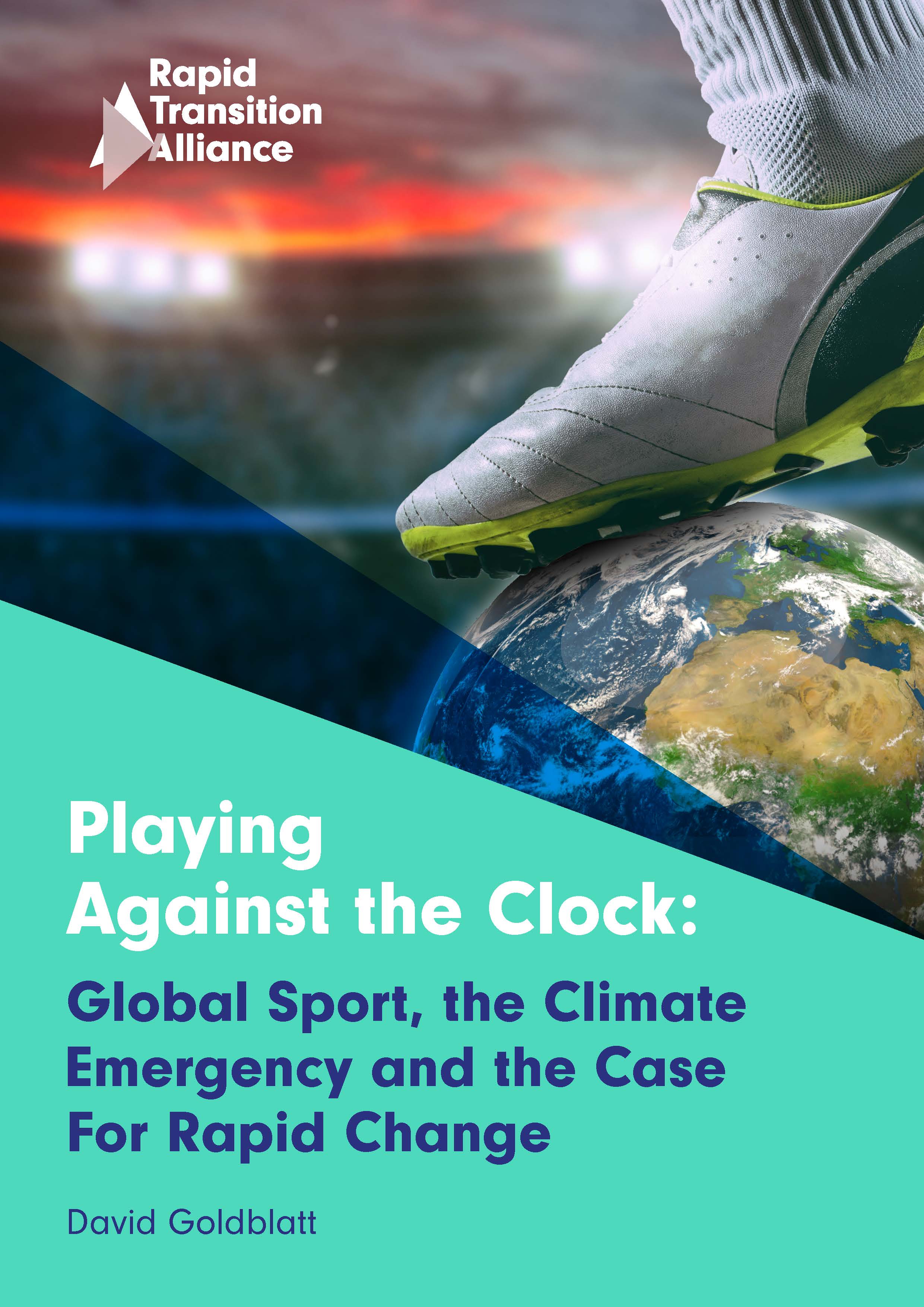Climate change is touching every aspect of human life and global sport is no exception: in 2019, the Rugby World Cup was disrupted by unprecedented pacific typhoons; in early 2020, the Australian Tennis Open was disrupted by the smoke blowing in from the country’s devastating bush fires. The Tokyo 2020 Olympics were forced to move long distance running events north of the capital as the city’s sweltering summer weather now makes them impossible to run.
Coronavirus is not climate change, but there are a number of clear lessons from the current crisis: take the science seriously and assume the worst-case scenario can happen; act now not later, and act radically. The kind of air pollution pushing climate instability, also worsens the impact of respiratory illnesses like those caused by Covid-19. If sport moved on this agenda, what kind of changes would it make?
“Sport provides some of society’s most influential role models. If sport can change how it operates to act at the speed and scale necessary to halt the climate emergency, others will follow,” says Andrew Simms, coordinator of the Rapid Transition Alliance, “If its’ players also speak out and say they believe clean air and a stable climate matter, millions more will see the possibilities for change. It will not only send a send a message of hope for the wider world, but it will help to guarantee a planet that is safe for sport. A first step would be to bring an end to sponsorship from fossil fuel companies and products promoting fossil fuel intensive lifestyles. At the moment sport is part of the problem, but it can become part of the solution.”
“As David Goldblatt and his team unmistakeably show, a concerted effort in sport to counter climate change is long overdue. We must all be ready to revise the ways we organise our events and tasks, and Play the Game is happy to take a first step by supporting this stimulating publication. But we won’t stop here. Climate action must be an essential part of sports governance. At our next international conference in 2021 sport and climate change will be a main theme, and we’ll do our best to engage our global network of reporters, sports leaders, athletes and officials in raising their game.”
– Jens Sejer Andersen, International director of Play the Game
We are already deep into extra time. According to the IPCC, if we are to mitigate the worst aspects of climate change then we need to carbon reductions in the next decade, but global sport can offer vital and visionary climate action leadership.
Press coverage
- Climate change: Sport heading for a fall as temperatures rise, by Matt McGrath, BBC News: https://www.bbc.co.uk/news/science-environment-53111881
- Climate crisis threatens future of global sport, says report by Matthew Taylor, Guardian: https://www.theguardian.com/environment/2020/jun/20/climate-crisis-threatens-future-of-global-sport-says-report
- Quarter of English football league grounds at risk of flooding within 30 years by Tim Wigmore, Telegraph:
https://www.telegraph.co.uk/football/2020/06/19/quarter-english-football-league-grounds-risk-flooding-within/
- The sporting opponent that could beat every single athlete, CNN: https://edition.cnn.com/2020/06/20/sport/climate-change-sport-intl-scli-gbr-spt/index.html
- France – Climate crisis threatens future of world sport, says report, Fr24news: https://fr24news.com/a/2020/
- Italy – Sky Sports: https://tg24.sky.it/scienze/2020/06/22/olimpiadi-invernali-cambiamenti-climatici
- Brazil: https://globoesporte.globo.com/olimpiadas/noticia/mudancas-climaticas-podem-impedir-que-sedes-das-olimpiadas-de-inverno-voltem-a-receber-eventos.ghtml
- EU – PlanetSki: https://planetski.eu/2020/06/22/climate-report-claims-many-winter-olympic-hosts-could-not-stage-games-in-future/
- Climate News Network: https://climatenewsnetwork.net/sports-carbon-footprint-is-global-bad-news/
- Norway: https://www.abcnyheter.no/nyheter/sport/2020/06/22/195686107/rapport-klimaendringene-kan-bli-vintersportens-dod
- Hungary: http://azonnali.hu/cikk/20200620_a-klimavaltozas-a-sportvilagot-is-alaposan-felforgatja
- Bulgaria: https://www.dnevnik.bg/sport/2020/06/22/4081701_promenite_v_klimata_shte_uslojniat_provejdaneto_na/
- At Large | The climate crisis will require sport to develop a new appetite for bold thinking by Eoin Connolly, Sports Pro Media https://smartseries.sportspromedia.com/thought-leadership/sport-climate-change-report-david-goldblatt-winter-olympics-hosts-bushfires
- Cricket among sports to be hit by climate change: Study by Kiran Pandey, Down to Earth https://www.downtoearth.org.in/news/climate-change/cricket-among-sports-to-be-hit-by-climate-change-study-71933
- Tokyo 2020: Covid-19 overshadowing Olympic battle with climate change by Johnathan White, South China Morning Post https://www.scmp.com/sport/other-sport/article/3090891/tokyo-2020-covid-19-overshadowing-olympic-battle-climate-change
- The Stadium is on fire, Sport and Sustainability International https://www.sportsustainability.org/news-events/the-stadium-is-on-fire
- The carbon footprint of the sports world can be compared to that of an entire country by Vitor Paiva, Hypeness https://www.hypeness.com.br/2020/06/pegada-de-carbono-do-mundo-dos-esportes-pode-ser-comparada-a-de-um-pais-inteiro/
 A new report – Playing against the clock: Global sport, the climate emergency and the case for rapid change – by leading academic and author, David Goldblatt, written for the Rapid Transition Alliance, provides the first provisional estimate of the impact of global sport on the climate and warns that the climate emergency will have far more severe consequences for several sports.
A new report – Playing against the clock: Global sport, the climate emergency and the case for rapid change – by leading academic and author, David Goldblatt, written for the Rapid Transition Alliance, provides the first provisional estimate of the impact of global sport on the climate and warns that the climate emergency will have far more severe consequences for several sports.